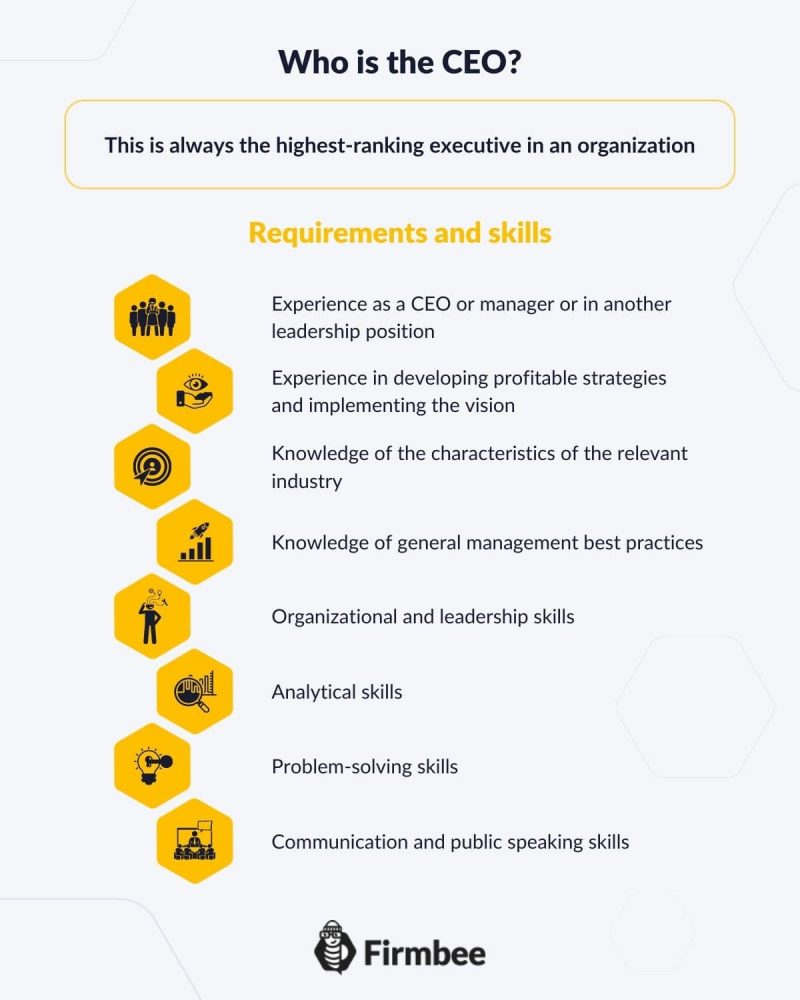The CEO, understood as the person holding the most important position in an organization, conducts a number of activities on a daily basis to manage the company efficiently. But what exactly are they? What does a CEO do? What is on their daily to-do list, what do they focus on and what delegate? Read our article to find out and more.
What does a CEO do? – table of contents
- CEO – who is it?
- What does a CEO do?
- CEO – core responsibilities
- CEO Responsibilities
- Requirements and skills
CEO – who is it?
The CEOs are those responsible for the overall success of a company. By making management decisions at the highest level, they are always the highest-ranking executive manager in the organization. They are responsible for the overall success of the organization and is the ultimate decision-maker in the company.
The main function that the CEO performs is to manage and evaluate the performance of other executive leaders, including presidents, vice presidents, and directors, depending on the reporting structure of the organization. In the process of directing the leaders, the CEO must be sure that they are moving in the same direction and setting goals that align with the company’s charter goals. He must also be sure that the leaders of the organization are rewarded appropriately for their performance. Through proper management, the CEO can achieve the desired success and profitability.
What does a CEO do?
The CEO task is to monitor the health and productivity of the company, manage a number of ongoing processes as well as delegate work to managers who are often better equipped for specific tasks in detail. Additionally, they are the ones leading efforts to support profitability through effective management, while setting priorities to ensure long-term business success.

CEO – core responsibilities
The responsibilities of the CEO vary as it would certainly be difficult to find two CEOs who have similar ones. However, it is possible to find common ground. Here they are.
Basic CEO Responsibilities:
- Planning, developing and implementing company strategy and regulatory actions.
- Analyzing and making recommendations on long-term initiatives.
- Analyzing budgets, financial reports and trends, and operating procedures.
- Supporting the board of directors and senior management.
- Work to implement and enforce organization policy and procedure.
- Maintain communication with the entire organization and the Board of Directors.
- Providing guidance and mentoring to other members of executive management.
- Educating departments and key members of the executive management team.
- Evaluating potential mergers, acquisitions or partnerships.
- Serving as a strategic advisor and consultant offering expert advice on contracts, negotiations or business transactions.
- Evaluating the company’s financial, operational, and sales and marketing activities to plan for continuous improvement and ongoing operational efficiencies.
CEO Responsibilities
The CEO is responsible for providing strategic, financial and operational leadership to the company. He coordinates activities and works closely with the board of directors and the senior management team.
However, the CEOs’ responsibility depends on many factors. In smaller companies, they often make personnel decisions for lower-level employees. They also frequently handles other work, such as in startups where the role of the owner is combined with that of the CEO. Then, they take care of everything that is in demand in a given situation, like marketing, sales, or accounting.
These looks differently in large corporations, where CEOs deal with high-level management and strategic decision-making. They make, frequently risky, investment decisions to grow the business and increase profits. He oversees all business operations and activities to ensure that they produce the desired results and are in line with the company’s overall strategy and mission.
We must also not forget that CEOs shape the culture of the organization, helping to define the attitudes, behaviors, and values they want the organization’s employees to exhibit. A good CEO continually models the attitudes desired by employees.
Requirements and skills
A CEO should exhibit several skills that will enable the company to thrive. These include:
- Experience as a CEO or manager or in another leadership position.
- Experience in developing profitable strategies and implementing the vision.
- Knowledge of the characteristics of the relevant industry.
- Knowledge of general management best practices.
- Organizational and leadership skills.
- Analytical skills.
- Problem-solving skills.
- Communication and public speaking skills.
All the skills listed make up a perfect CEO. The presence of as many of these qualities as possible will allow you to perform your management duties to the fullest.
The duties of the CEO include both purely managerial duties, as well as those related to data analysis and communication with the external and internal environment of the company. All of these creates a picture of the CEO as a person who is, on the one hand, focused on data analysis and, on the other, able to speak convincingly to any audience.
Read also: What is a CEO?
If you like our content, join our busy bees community on Facebook, Twitter, LinkedIn, Instagram, YouTube, Pinterest.
Author: Andy Nichols
A problem solver with 5 different degrees and endless reserves of motivation. This makes him a perfect Business Owner & Manager. When searching for employees and partners, openness and curiosity of the world are qualities he values the most.
The most important questions
-
Who is the CEO?
This is always the highest-ranking executive in an organization.
-
What does a CEO do?
The CEO manages a number of processes within the company. First, he delegates work to managers and leads activities to support profitability through effective management.
-
How is the CEO responsible for shaping the culture of the organization?
The CEO helps define the attitudes, behaviors and values desired in an organization's employees and then models those attitudes.


















